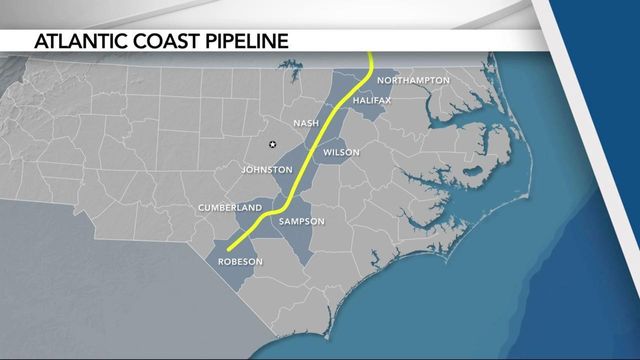Governor's Office: No legislative say over pipeline fund spending
Legislators won't get to decide how to spend a nearly $58 million fund being set up to mitigate the environmental impacts of the Atlantic Coast Pipeline, a spokesman for Gov. Roy Cooper said Tuesday night.
Posted — UpdatedCooper spokesman Ford Porter reached out to WRAL News Tuesday evening after a piece on @NCCapitol (available below) indicated otherwise. Porter took issue with the post's headline and said the governor is not open to legislative involvement in the fund.
Cooper's comments earlier in the day made it seem like this was a possibility.
Specifically, an Associated Press reporter asked Cooper whether he had concerns about the fund's constitutionality. Legislators have questioned whether the fund as laid out in a memorandum – fully controlled by the executive branch – is constitutional, given the legislature's role in appropriating state funds.
The governor replied that the fund represents "a great opportunity" and that "we've got time to work on the structure ... make sure that it operates in the right way." Pressed on whether he believed the fund might be overturned in court, the governor replied, "I don't, and particularly when we get the structure, I think people will understand it better."
WRAL News asked: "Would the General Assembly have some say over how the money's spent?"
"We're working on structure," Cooper replied. "We're figuring that out at the moment."
After WRAL News ran a piece indicating that the governor had opened the door to some legislative control of the fund, Porter reached out to say that is not the case.
"We do not envision that the legislature will play a role in this process," Porter said.
==========
Here is the previous post, along with the headline in bold:
Gov. Roy Cooper said Tuesday that his administration is working on structuring oversight of a $57.8 million mitigation fund created as part of the Atlantic Coast Pipeline project.
The $5 billion pipeline, which will be owned by Duke Energy, Dominion Energy and other utilities, will carry natural gas from West Virginia to southeastern North Carolina, running through eight North Carolina counties along the Interstate 95 corridor.
Legislative leaders insist they, not the governor, have the legal authority to direct how any money in the fund is spent.
"The timing seemed a little suspicious to me – and maybe suspicious is the wrong word – but the timing certainly seemed off because I've been following the ACP for several years now, and I've never heard any mention of this from any of the participants before now," said Rep. John Szoka, R-Cumberland, whose district includes part of the pipeline route.
Legislative staff sent the Governor's Office questions about the fund, but Szoka said the answers they received were vague. He has asked someone from the administration to discuss the deal at the next House Energy & Public Utilities Committee meeting.
"We need to find out answers on it to find out why we're doing this," he said.
Duke spokeswoman Tammie McGee said the mitigation fund was a required part of the federal permitting process and wasn't tied to the state permit.
"Throughout the permitting process for the Atlantic Coast Pipeline, we worked very hard to minimize any impacts to historical, cultural and environmental resources. However, for a project of this size, some impacts are unavoidable," McGee said in an email to WRAL News. "As part of receiving federal approval for the project (from the Federal Energy Regulatory Commission), we’re required to work with all three states through which the pipeline passes to develop mitigation measures."
Cooper said the fund represents a "great opportunity," and some communities have already reached out about tapping the money.
"We've got time to work on the structure. We've got time to make sure that, because there's no money yet and we've got time to work on that, to make sure that it operates in the right way, that we get a lot of public input as to what we need," he said.
When asked if lawmakers would have some say over how the money is spent, he responded again, "We're working on structure. We're figuring that out at the moment."
"When we get the structure, I think people will understand it better, and it'll be positive," he said.
A spokesman said House Speaker Tim Moore hasn't been contacted by the Cooper administration about the mitigation fund. Senate President Pro Tem Phil Berger's office didn't respond to requests for comment.
Rep. Pricey Harrison, D-Guilford, said she's disappointed that the water permit was granted, but she's less skeptical of the fund.
"I wasn't involved in the negotiations, but I understand that that was part of the process," Harrison said. "It wasn't that they were paying $57 million or whatever it was to get the permit. It was just that that was a condition of getting the permit granted was the access to this fund that would try to undo some of the damage that was created by the pipeline, and that seems like a legitimate use."
"I regret that I did not more artfully or precisely tailor my comments to WRAL last week, so let me set the record straight," Harrison wrote. "The fund, established in the Memorandum of Understanding, which would be used to protect against environmental degradation created by the pipeline as well as for economic development projects in the affected counties, was negotiated SEPARATELY from the permitting of the project. It was not connected to the permitting of the project. My initial comments to WRAL were inaccurate on that point, and I apologize for this misunderstanding."
• Credits
Copyright 2024 by Capitol Broadcasting Company. All rights reserved. This material may not be published, broadcast, rewritten or redistributed.






